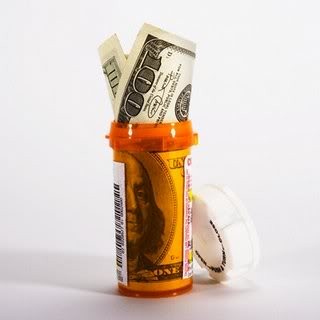Repeal of the Rx Gift Ban to Cost Mass. $750 Million
Thursday, April 26, 2012

This consumer protection law established regulations that would keep pharmaceutical companies from giving gifts such as trips, meals, and alcohol to doctors. Another cause of concern is the allowance of coupons on big-name medications – decreasing the sales of generic, less costly prescription drugs. The ban has been in place since 2008.
Groups such as the Massachusetts Public Interest Research Group (MASSPIRG) are worried that if this portion of the budget is not struck down, there would be costly affects for small business owners and residents paying health care premiums. MASSPIRG states that health care is the fastest growing household expense, jumping 48% in the last 7 years to an average cost of $14,606 per family. MASSPIRG claims prescription drugs have been the fastest growing portion of our skyrocketing health care costs in recent years.
Those wishing to repeal the ban say that the state has prosperous ties with pharmaceutical companies and that keeping the ban in place would hurt the industry in Massachusetts.
The Cause for Concern
What’s at risk? According to Deirdre Cummings, Legislative Director with MASSPIRG consumers and small businesses will suffer due to big pharma’s marketing strategy.
“It’s a marketing strategy. The most typical gift is meals provided by the industry to physicians to talk about drugs. And there are other arrangements and hidden fees,” she said. “We prohibited it in 2008, and language in the state budget now would remove the ban. The cost to consumers comes as the drug reps market only the expensive, name brand drugs. The consumers pay for the meals and the drugs prescribed.”
Dinners with doctors
State Rep. John Mahoney told GoLocalWorcester the restaurant ban is hurting business in the Bay State. "We are the only state that doesn’t allow doctors to have dinner with pharma companies. I don’t think doctors are being swayed by a free meal. People who own restaurants are getting hurt by this. Companies are going to other states to work around this law. They are holding events and dinners in neighboring states."

Cummings sees the gift ban as a reversal of the hard work their group has put into diminishing the conflict of interest between physicians, patients, and pharmaceutical companies.
“We’ve invested a lot of time to reduce the cost of health care and get costs under control. These two amendments would go in the opposite direction,” she said.
“We don’t have a figure on the cost there, as the pharmaceutical companies would hide it, but common sense lets us know that they wouldn’t invest billions without a sizable expected return,” Cummings said.
While the issuing of coupons for name-brand drugs sounds like a good thing for consumers, this practice will also be a problem and a financial burden, according to MASSPIRG.
“If we allow the pharmaceutical industry to use coupons here, it would increase the cost over 10 years to 750 million in Massachusetts,” she said, drawing from data from the Pharmacy Benefits Management meeting which takes statistics from states that allow coupons and states that don’t.
“Again, it’s a marketing strategy that pharmaceutical companies use to sell their most profitable drugs. You don’t see coupons offered on the generic drugs, but on the top name ones.”
“It’s also bad for small businesses. Anything that increases the costs of health care is hyper problematic for small businesses that are struggling in this economy and trying to provide for employees,” she said.
When asked about whether he thought this bill would be bad for small business paying health care premiums, Rep. James O’Day said that he had no comment.
Another Side of the Issue

According to MA Rep. Jason Lewis, who is working to stop the amendment from passing, those on the other side of the issue have their reasons.
“We want to make sure they have the best interest of patients. There are opponents who say that that argument is well and good, but it’s hurting the pharmaceutical industry in Massachusetts,” he said.
Indeed pharmaceutical companies have a lot of stake placed in Massachusetts. Thanks to jobs in biotech, research and development, and medical centers across the state, make the state a national leader. Some voters argue that this will hurt a vital source in the state economy as well as the doctors who use this funding for research and employment.
Speaker of the Massachusetts State House, Robert A. DeLeo is also opposed to the ban.
“Hopefully individual representatives will make their own decisions based on what they’re hearing from constituents and the pros and cons of the issue. I hope that they will decide to not seek a repeal,” said Lewis.
A Conflict of Interest
Lewis has been in charge of an amendment filed with co-sponsors that would strike down the provision in the budget that upholds the current ban.
“The gift ban has been in place since ’08, and my hope is that it won’t be in the final budget passed by the end of this week,” Rep. Lewis said. The reason I support it is because it’s working. It really has helped to reduce conflicts of interest when pharmaceutical companies give lavish meals and trips to physicians and nurses. This is to make sure there’s no room for conflict of interest.”
Lewis’s answer to the opposition on the bill is straightforward.
“These companies aren’t invested in Massachusetts. We’ve seen that healthcare and medical schools are adopting the same or stronger rules than the state put in place. UMass for example, Partners Healthcare, and others have all adopted strong policies that seek to avoid these conflicts.”
Related Articles
- Central MA Doctors Paid Millions By Pharmaceutical Companies
- Doctors And Drug Companies: The Other Side Of The Story
- NEW: UMass Memorial Doctor Fills in as Worcester’s Health Commissioner
- Paul Levy: Lowering Health Care Costs by Paying Doctors More




Follow us on Pinterest Google + Facebook Twitter See It Read It